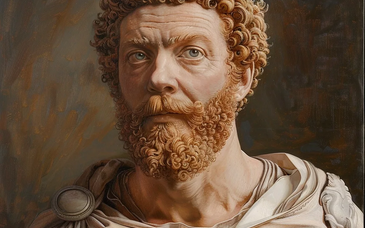As in any large society with growing sophistication and complexity there arises the need for ever more governmental offices to oversee and regulate aspects of life.In the Roman Republic the following offices were created in order to deal with the expanding demands on government.
- Consul (Head of State)
- Dictator (Ruler in Crisis)
- Pontifex Maximus (Religion)
- Censor (Public Morality)
- Praetor (Law Officer)
- Aedile (Public Works)
- Quaestor (Treasurer)
The following assemblies were created to rule over Rome, her people and her empire.
- The Senate (Patrician Assembly)
- Comitia Curiata (Ward Assembly)
- Comitia Centuriata (Military Assembly)
- Concilium Plebis (Plebeian Assembly)
- Comitia Tributa (Tribal Assembly)
Rome's revolt against her Etruscan despots made her the champion of Latinism against both Etruscans and Sabellian or Oscan hillmen, of whom the most prominent were at this time Aeqians on the north and Volscians on the southeast of the plain of Latium, where the Latin cities were Rome's natural but jealous allies.
Consequently Rome was always at war, attacked or attacking her Etruscan neighbour Veii, or the Volscians or Aequians, or an occasional Latin foe. Meanwhile the Hernicans, who were alike the Latins wedged between the Aequians and the Volscians, preferred alliance to Rome.
When the Etruscan sea power was shattered by Hieron of Syracuse at Cumae the menace from Etruria was so much weakened that for nearly forty years there was no war with Veii.
The Aequian and Volscian powers were broken. In all wars of the fifth century BC the balance of victory lay with Rome and her allies.
Usually this involved a gain of territory by the victors, the lion's share going to Rome whose strength therefore constantly increased.
By the end of the fifth century BC Rome had in fact become all but the mistress of Latium. The Latin cities, known as the Latin League, might have still been independent, but they were increasingly subject to Roman power and influence.
A final war with Veii ended with definite conquest (396 BC) which added a great area on the west of the Tiber to Roman territory.
The decisive victory was in part due to pressure on Etruria by a new enemy, the Gauls, who by this time had completely overrun the basin of the Po and from there were crossing the Apennines into Etruria itself.
The Etruscans had also been driven out of their possessions in Campania, south-east of Latium, by the Samnites, descending from the hills.
With Etruria already being submerged by the Celtic flood at the fall of Veii, six years later (390 BC) it burst into Rome itself.
Legends afterwards told of that invasion; of the barbarians who broke into the senate house and were awestricken by the sublime dignity of the silent seated senators; of the attempt to surprise the capitol which was frustrated by the cackling of geese which warned the Roman guards; of the huge ransom which was being weighed out when the Gallic chief Brennus tossed his sword onto the scale with the words 'Vae victis' ('Woe to the vanquished'); and of the sensational deliverance wrought by the hero Camillus, the conqueror of Veii.
The definite fact which survives is that the Gauls, having swept devastatingly over Etruria, poured into Rome, sacked it, and then rolled back to the north.
Etruria never recovered from the blow whilst Rome reeled under it. The Aequians and Volscians, joined even by some of Rome's dependant allies, seized the moment to make a last desperate attempt at dominance of Latium, only to find themselves broken by Rome's indomitable tenacity.
The Latin League was reorganized in a form which made it even more dependent on Rome than before. Its chief city, Tusculum, was absorbed into Roman territory with her people receiving full Roman citizenship. (380 BC).
Rome was queen of Latium from the hills to the Mediterranean, from the borders of Campania to the Tiber, a substantial section of Etruria finally under her sway.
It was precisely at this moment that the long struggle between the patricians and the plebeians was definitely decided in favour of the plebeians by the abolition of the privileges which restricted administrative offices to men of patrician birth.
At the outset of the republic, the patricians did not only the means to exercise power, but all the actual power as well. The general rise of influence of the plebs was not achieved by revolution but by a gradual in their influence as Rome developed. One major concession was the creation of the office of the tribunis plebis (tribune of the people) in about 494 BC to present the people's grievances to the consuls or the senate. A tribune had extraordinary powers. Whereas a government official could hinder or quash an act of an official of the same rank, a tribune could hold up almost any business of state, including resolutions of the senate, merely by pronouncing his veto. He was required to be on call day and night to any citizen who required his help.
Rome in these days was probably still a society where contact between different social classes was probably still relatively easy. And though today's view of the Republic is undoubtedly tinged with romanticism, it seems reasonable to suppose that both the elite and society as a while were united and that the lower orders were largely satisfied with the leadership of the nobility and with the rewards to be won under their command.





